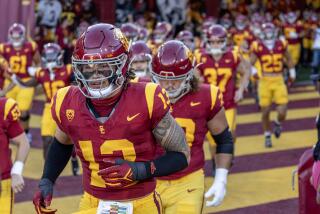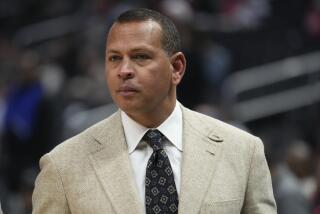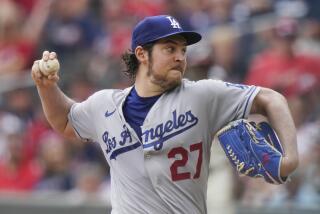Athletes Might Testify at Trial
- Share via
As the federal government pursues a case against four men who allegedly ran a steroid distribution ring, prosecutors have shielded the identities of dozens of athletes they believe received the performance-enhancing drugs.
But documents filed in a San Francisco courthouse suggest that at least some of those athletes will be called to appear in open court if the case goes to trial.
“I don’t think they are going to be allowed to testify with a cloak over their heads,” said Douglas Schwartz, an attorney for several athletes he said might be subpoenaed.
In a motion filed late last month, the U.S. attorney’s office said it intends to call one of Schwartz’s clients, an unnamed track and field athlete who allegedly told investigators about using steroids and human growth hormone.
Prosecutors have declined to comment.
The case revolves around a small Northern California company called Bay Area Laboratory Co-Operative, or BALCO. Company President Victor Conte and Vice President James Valente stand accused of conspiring to distribute performance-enhancing drugs with help from personal trainer Greg Anderson and track coach Remi Korchemny.
A parade of high-profile athletes, including Barry Bonds and Marion Jones, testified in front of a grand jury in the fall, but prosecutors have refused to say who they believe actually used steroids.
Bonds has been most closely linked to the case because Anderson is his trainer, but has denied using steroids, saying he was a BALCO client only for blood testing and nutritional supplements. Jones said her only connection was a few conversations with Conte.
In their recent motion, prosecutors described a portion of their case against Korchemny.
The coach has worked with several famous runners, including British sprinter Dwain Chambers and American sprinter Kelli White, both of whom flunked drug tests in 2003.
The unnamed athlete in the court document allegedly met with Korchemny and Conte to discuss performance-enhancing drugs. The athlete told investigators about subsequently taking a drug Conte called “The Clear,” a steroid later identified as tetrahydrogestrinone, or THG.
“This testimony will plainly play a significant role in the United States’ case,” the motion says. “ ... The government intends to call that witness at trial.”
Attorneys for Anderson have said he would be willing to accept a plea bargain if it meant keeping his star client, Bonds, off the witness stand.
But other attorneys in the case were not similarly inclined.
“We’ve got clients to represent,” said Troy Ellerman, the attorney for Valente. “If that requires baseball players testifying, it requires baseball players testifying.”
The prospect of athletes testifying prompted the government’s motion, which sought to have attorney Schwartz disqualified from representing Korchemny.
Prosecutors claimed a conflict of interest would arise if the athletes Schwartz represents take the stand to testify against his other client, Korchemny.
A hearing on the matter has been scheduled for Friday and Schwartz said he expects a replacement will be selected.
More to Read
Sign up for Essential California
The most important California stories and recommendations in your inbox every morning.
You may occasionally receive promotional content from the Los Angeles Times.











